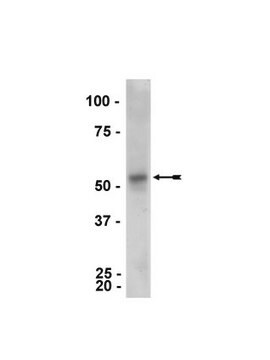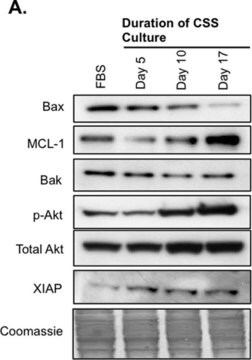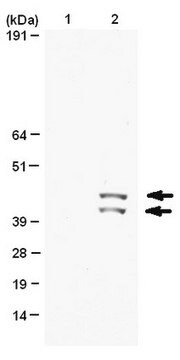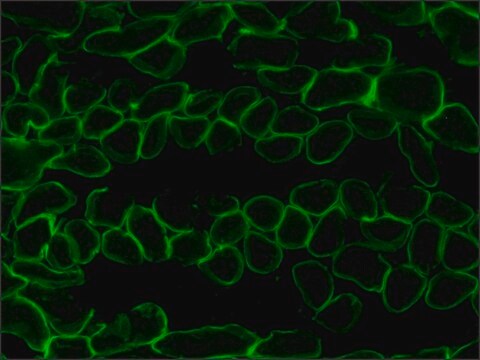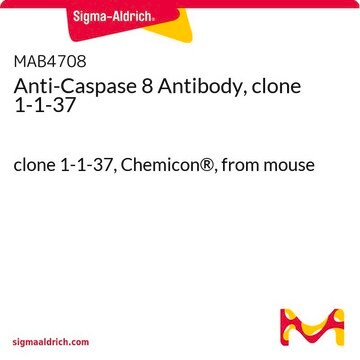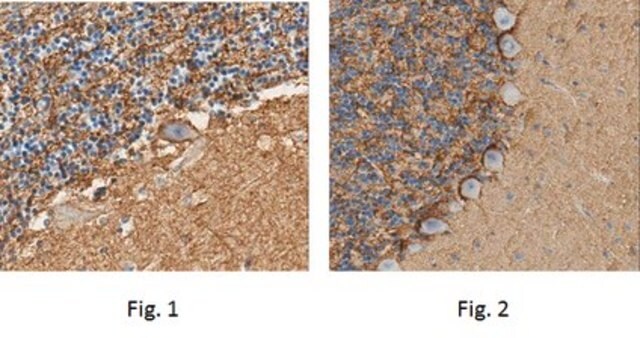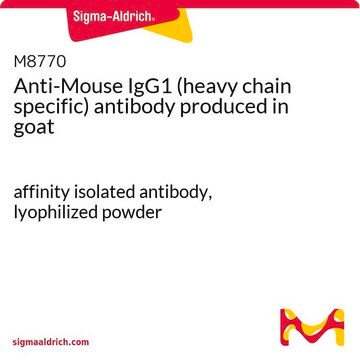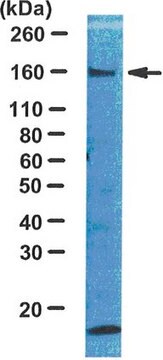15-107
MAPK Pathway 1 Explorer Antibody MiniPack
clone AW39R, 1 mg/mL (05-538SP), Upstate®
別名:
Oncogene RAF1, raf proto-oncogene serine/threonine protein kinase
About This Item
IF
WB
activity assay
multiplexing
flow cytometry: suitable
immunofluorescence: suitable
multiplexing: suitable
western blot: suitable
おすすめの製品
クローン
AW39R
品質水準
化学種の反応性
mouse (05-538SP), Xenopus, chicken, human (05-538SP), rat
メーカー/製品名
Upstate®
濃度
1 mg/mL (05-538SP)
テクニック
activity assay: suitable (kinase and phosphatase)
flow cytometry: suitable
immunofluorescence: suitable
multiplexing: suitable
western blot: suitable
輸送温度
dry ice
遺伝子情報
human ... MAP2K1(5604) , RAF1(5894)
詳細
Each Pathway Explorer Antibody Minipack contains three related antibodies as part of a signaling cascade or a combination of total and phosphorylated forms of key signaling targets. Each of the three antibodies are 30% the original pack size. Full size versions of each of the Pathway Explorer antibodies are available for sale individually under the same catalog number with the removal of “SP” off of each one (e.g. 05-591SP can be ordered as 05-591).
Erk1/2:
Erk (Extracellular signal-Related Kinase) is a family of two, highly homologous proteins denoted as Erk1 (p44, MAPK3) and Erk2 (p42, MAPK1) that both function in the same pathway. The two proteins are often referred to collectively as Erk1/2 or p44/p42 MAP kinase. The Erk pathway is considered the classical, canonical MAPK (Mitogen-Activated Protein Kinase) signaling pathway. It is an evolutionarily conserved pathway that controls and is a critical regulator of the growth and survival through the promotion of cell proliferation and the prevention of apoptosis. Erk is involved in the control of many fundamental cellular processes including cell proliferation, survival, differentiation, apoptosis, motility and metabolism. Erk is activated by growth factor stimulation of receptor tyrosine kinases (RTKs), GPCR, and/or integrin stimulation. This activates the Ras-Raf-MEK-Erk pathway that results in the phosphorylation/activation of Erk1/2 (p44/p42) on the TxY motif (Thr202/Tyr204 and Thr185/Tyr187 for Erk1 & Erk2, respectively).
Raf:
The Raf proteins (A-Raf, B-Raf, Raf-1/c-Raf) are Ser/Thr kinases with homology to the PKC family, containing an N-terminal regulatory domain and a C-terminal catalytic domain. Raf (MAP Kinase Kinase Kinase) is the top kinase in the canonical MAPK pathway. Members of the Raf family bind to activated Ras. Ras, in its GTP-bound active state, activates the kinase activity of Raf. This results in Raf translocation to the plasma membrane and activation. Once activated, Raf then binds to and activates MEK (MAP Kinase Kinase) by phosphorylating it on the two residue motif. It is thought that B-Raf might be the predominant activator of MEK and that Raf-1 has a role in protection against apoptosis; a process that does not require either its kinase activity or its activation of MEK. The regulation of a large number of cellular processes are dependent upon the activation state of ERK, so the controlling of this pathway could have profound effects on various diseases. Activation of Raf-1 involves phosphorylation of Ser338/339 and Tyr340/341. Activating mutations of B-Raf that disrupt its auto-inhibition loop have been implicated in a number of cancers, including melanoma and colon cancer.
MEK1/MEK2:
MAP Kinase/Erk Kinase (MEK), alternatively known as MKK, is a true dual-specificity kinase, in that it phosphorylates the MAP kinases (Erk1/2; p44/p42)) on both the Thr and Tyr of the activation motif TEY. In vitro, the tyrosine phosphorylation is favored, whereas in vivo both phosphorylation events appear to occur simultaneously. This suggests that an additional factor is present in cells to facilitate the reaction. MEK1 and MEK2 are activated by phosphorylation of two serine residues (Ser218/222 in MEK1 and Ser222/226 in MEK2), which are substrates for the Raf family of kinases. Mutation of the phosphorylation sites from Ser to Asp creates a protein with constitutive kinase activity, which when expressed in cells is able to cause transformation.
* See full size versions for corresponding references.
特異性
免疫原
アプリケーション
細胞シグナル伝達
アポトーシス及び癌
MAPキナーゼ
Flow Cytometry Analysis:Jurkat cells were fixed, permeablized, and stained with anti-phospho-Erk 1/2 (Thr202/Tyr204, Thr185/Tyr187).
包装
構成
05-747SP Anti-phospho-MEK1 (Ser218/222)/ MEK2 (Ser222/226)
05-797RSP Anti-phospho-Erk 1/2
(Thr202/Tyr204, Thr185/Tyr187), recombinant clone AW39R
ターゲットの説明
物理的形状
(Thr202/Tyr204, Thr185/Tyr187), recombinant clone AW39R
保管および安定性
Handling Recommendations: Upon receipt, and prior to removing the cap, centrifuge the vial and gently mix the solution. Aliquot into microcentrifuge tubes and store at -20°C. Avoid repeated freeze/thaw cycles, which may damage IgG and affect product performance.
アナリシスノート
05-538SP:3T3/NIH cells
法的情報
免責事項
保管分類コード
10 - Combustible liquids
適用法令
試験研究用途を考慮した関連法令を主に挙げております。化学物質以外については、一部の情報のみ提供しています。 製品を安全かつ合法的に使用することは、使用者の義務です。最新情報により修正される場合があります。WEBの反映には時間を要することがあるため、適宜SDSをご参照ください。
毒物及び劇物取締法
キットコンポーネントの情報を参照してください
PRTR
キットコンポーネントの情報を参照してください
消防法
キットコンポーネントの情報を参照してください
労働安全衛生法名称等を表示すべき危険物及び有害物
キットコンポーネントの情報を参照してください
労働安全衛生法名称等を通知すべき危険物及び有害物
キットコンポーネントの情報を参照してください
カルタヘナ法
キットコンポーネントの情報を参照してください
Jan Code
キットコンポーネントの情報を参照してください
試験成績書(COA)
製品のロット番号・バッチ番号を入力して、試験成績書(COA) を検索できます。ロット番号・バッチ番号は、製品ラベルに「Lot」または「Batch」に続いて記載されています。
ライフサイエンス、有機合成、材料科学、クロマトグラフィー、分析など、あらゆる分野の研究に経験のあるメンバーがおります。.
製品に関するお問い合わせはこちら(テクニカルサービス)